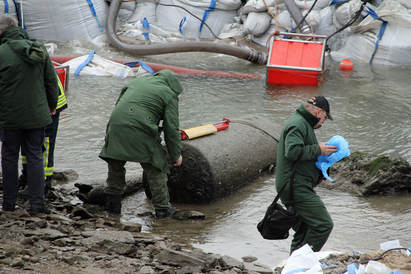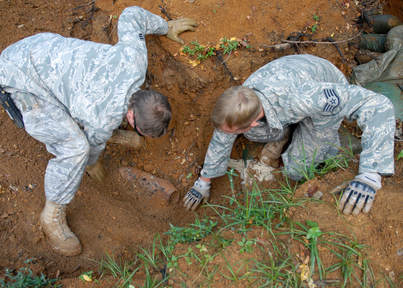|
[Note: This post continues a previous post, Bombs, Grief and Grace: Living with Loss.] In my last post, I tried to craft a simile between a bomb crater and grief. It was just another way of looking at the effects of time on pain, sorrow, and sadness. I was looking for a different take on the healing power of grace and time. Among the comments I received, one from an old friend, Sandy, really grabbed my attention. Sandy has recently experienced significant loss, and her insight is keen. She acknowledges the healing power of grace and time, but adds-- As I live and walk through this grief, I sometimes find myself tripping over hidden pieces of shrapnel. It is then that I find myself on my knees once again, begging for eyes to see his goodness…thanking God for his grace that picks me up and returns me to walking with him. Sandy’s words jarred me into realizing that my original simile was incomplete. Although time and grace do ease our sorrow, every passing day is not always better than its yesterday. They’re not always good days. Painful days often can and do present themselves months and even years after the loss. This fact caused me to look for a way to extend the simile of the crater. A news headline from the BBC gladly obliged me: “London City Airport Shut as WW2 Bombs Found Near Thames.” Europe and many other places are littered with buried unexploded munitions. The Smithsonian Magazine records that the Allies dropped “2.7 million tons of bombs on Europe…yet as many as ten percent of the bombs…failed to explode.” The author goes on to note that as of 2016, “more than 2000 tons of unexploded munitions are uncovered on German soil every year.” The article only covers bombs dropped by the Allies. The Axis powers also dropped huge numbers of bombs, notably on Britain. Sadly, there are many more recent burial grounds for unexploded munitions. Vietnam, Cambodia, Laos, Syria, Kosovo, Iraq, Afghanistan, and the Ukraine come to mind. Time and tide have hidden most unexploded bombs deep in the earth. It is no surprise, then, that people going about their everyday business should unearth one. Digging a garden, plowing a field, building just about anything can turn an ordinary task on an ordinary day into a dangerous situation. Life stops until experts can deal with the bomb. So it is with grief. As we go about some mundane activity, we may unearth the past: a sight, a sound, a memory will unexpectedly bring back the pain of loss. Just as the construction workers on the banks of the Thames did not expect their day to be upended by uncovering a 70-year-old bomb, we sometimes unexpectedly experience the pain of an old loss. For obvious reasons, unexploded bombs must be taken seriously and dealt with most carefully. It would be both foolish and dangerous to ignore them, to shove them back in the ground, to pretend they don’t exist. Unless you are a gardener, farmer, or construction worker who happens to moonlight as a ordnance disposal expert, it is also unwise to try deal with an unexploded bomb by yourself. For your own good, you need to find and accept help. So it is with resurgent grief. We must take the situation seriously and deal with it gently, and accept the help of others. Perhaps the reopening of an old wound today may seem like betrayal of all of the effects of time and grace that brought us comfort on so many yesterdays. What got me through the years of my son’s illness, the moment of his death, and every one of the 8,077 days since that day is the knowledge that the grace and time that sustained me yesterday will sustain me today and tomorrow. God’s love and grace do not change. Time does not stand still. A temporary return to grief does not signal a failure on my part or on God’s part. The 8,077 days since I held my 12-year old son and felt his final heartbeat have not all been good days. But most of them have. I’m reminded of an obvious but profound truth I once read: So far, you’ve survived 100% of your worst days.* If you’re reading this, that statement must be true. So thank you, Sandy, for helping me extend the simile into something a bit more true to real life. No, they’re not all good days, but grace, time, and community still stand ready to comfort us. ------ *I would gladly cite the author, but I have been unable to determine who he or she is. If you know, please let me know. (c) 2018 Larry Pizzi
2 Comments
|
Larry Pizzi50 years of photographs and 35 years of keeping a commonplace book. Archives
March 2018
Categories |


 RSS Feed
RSS Feed